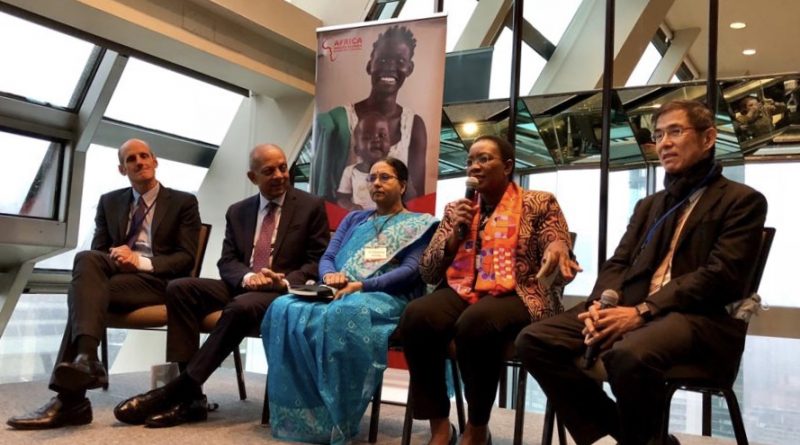While universal health coverage is essential, the implementation of such a system is complex and the private sector has a pivotal role to play in leading the charge.
Co-authored by Dr. Githinji Gitahi, Group CEO Amref Health Africa and Dr. Susanne Weissbaecker, Global Head of Access to Medicines, Takeda.
Dramatic advances in healthcare and medicine over recent decades have helped increase humanity’s average life expectancy, but the underlying reality today is that access to these innovations is far from equitable. Many people around the world still lack even basic access to care, innovative medicines and medical resources, especially in the evolving healthcare systems of low- to middle-income countries.
In these countries, patients are often excluded from existing healthcare systems or only have access to sub-standard care because they are required to pay “out of pocket” but lack the means to afford it. A 2017 joint report by the World Health Organisation (WHO) and the World Bank Group stated that more than half of the world’s 7.3 billion people do not receive all the essential services they need.
Patients also usually spend too great a proportion of their household budget on healthcare and are pushed into poverty, which compounds the problem further. The joint report found that over 800 million people spend at least 10 per cent of their household budgets on healthcare, and approximately 100 million of them are pushed into extreme poverty due to health expenses.
At the 2015 United Nations General Assembly, all Member States created a shared blueprint to achieve a better and more sustainable future for all. The core of this plan was a list of 17 Sustainable Development Goals. Goal number three is focused on ensuring healthy lives and promoting the well-being for all, at all ages. Under this Goal, one of the targets is to achieve universal health coverage (UHC) by 2030[1].
As countries develop and healthcare systems evolve, they naturally aim to achieve UHC to ensure that all people obtain the health services they need without suffering financial hardship when paying for them. Investing in UHC also leads to faster and more inclusive growth for economies.
However, a successful UHC system cannot be achieved alone. Knowledge, expertise, and financial responsibilities must be pooled. Non-siloed partnerships, complementary infrastructure, capacity and funding, buy-in from all stakeholders, including government authorities (health and financial), civil society, patient groups, healthcare professionals and private sector partners are all paramount.
Public debate has shown that there are strong views on whether the state or private sector funds UHC systems. Critics have said that private funding of a UHC system would likely lead to spiralling healthcare costs.
This prompts a critical question: what role should the private sector play?
Susanne: At Takeda, we believe that the private sector, particularly the pharmaceutical industry, plays an essential role in this complex journey. Beyond opportunities to bring stakeholders together to facilitate dialogue and align efforts, the private sector can do many things. This includes partnering with government and civil society to enhance access to high quality and innovative medicines by contributing towards the building and broadening of capacity in local health systems.
Technology is also an enabler for accelerating UHC. As the private sector has strong research and development capabilities, there is scope for technological disruption to help local health systems overcome existing barriers.
Convening partners to synchronise efforts along the continuum of care
Githinji: An example of how partnerships can be really impactful is the high-level consultation which took place in September 2018 on Equitable Access to Healthcare in Asia and Africa, in collaboration with Takeda and hosted by Amref Health Africa, and UHC 2030 alongside the 73rd Session of the UNGA. The event brought together prominent health leaders including ministers of health, representatives of major foundations, NGOs, UN agencies and private sector players to engage in a dialogue on critical drivers of UHC in Africa and Asia. The event showcased examples of progress towards the achievement of UHC in Africa and Asia, and shared some of the solutions, innovations and ideas that can make UHC a reality in the two continents by 2030.

Key insights in achieving UHC included:
- Scaling emerging technologies
Emerging and existing technologies can accelerate UHC in Africa and Asia if scaled rapidly. Technologies such as blockchain, artificial intelligence (AI) and mobile solutions have begun to enhance and transform the patient experience. Blockchain technology offers potential to counter fake pharmaceuticals and securely streamline medical records, while artificial intelligence can improve diagnosis and medical supply chains. Many creative mobile-based solutions also exist with the potential to leapfrog traditional healthcare infrastructure challenges.
However, such technologies need to be affordable, and clinically and economically relevant for communities, given the diverse contexts of different countries. Costly technologies that yield much-needed benefits should also be explored through measures that can make them available to the communities that need them most.
More is not necessarily better – to leverage the most impactful technologies, there is a need to first assess which technologies are working, and which ones are not, and identify opportunities for improvement. This process improves existing technologies or develops new ones that addresses current limitations, minimizes duplication and saves resources.
The need for partnership to implement such technologies is critical. It is not always clear which technologies should be adopted, how to use them, and how to finance or scale them. Governments in developing countries need support in identifying the best approach to improve healthcare. There is an opportunity here for the private sector to support governments as they make such efforts by providing technical expertise, financing arrangements, or other supporting mechanisms.
For example, developing a national digital partnership roadmap would be a promising intervention to support such multi-sector approaches as it would outline the roles of various sectors in digitizing health systems e.g. guiding national data collection on health and create opportunities for collaboration to scale technologies.
- ii) Community-focused interventions
The shift from traditional models of healthcare delivery to community-focused models requires developing and adopting decentralized and low-cost systems that encourage people to manage their own health.
For this to occur, there is a need to empower individual community members, including the most marginalized, to become agents of their own health. This will require empowering individual community members to realize that they are powerful and can demand for quality health as their right. This calls for leaders to listen to communities and ensure that they are responding to community needs in their health programs.
The state has a key role to play to ensure that there is an enabling environment for communities to have a say in their health. Part of achieving this will be to mobilize communities to have a stronger voice, a role which can be played by Community Health Workers (CHWs). CHWs do not have the level of authority required to influence political decisions on community health, and for this to occur CHWs should get integrated into local leadership and authority structures to enable them to have a stronger role in advocating for community health.

iii) Enhancing social accountability
With a devolved healthcare system and an increasing patient-centric approach to health, new methods of enhancing social accountability and strengthening engagement in decision-making will be needed. Tools such as citizen report cards, community score cards and civic education are currently used for social accountability. However, a lack of a clear definition of goals in programs, coupled with limited data often hampers the ability to measure and monitor impact and therefore maintain accountability. There are also limited consequences for providers or organisations if achievements regarding goals or objectives are not satisfactory.
Social accountability is often seen as a one-sided process where an institution is held accountable and reports back on its actions, while social accountability should be viewed as a two-way process to engage with service providers and identify opportunities to improve performance.
To achieve this, community empowerment should be a basic requirement. The lack of information among communities on how to hold institutions or governments accountable is currently a limiting factor. Further, there is often a lack of community ownership of the social accountability mechanisms available. The role of strong political will and governance in increasing the effectiveness of social accountability tools is critical.
- iv) Multi-stakeholder partnerships
Achieving UHC calls for a shift to an ecosystem approach to partnership building, where a wide variety of stakeholders align to find practical solutions to complex healthcare challenges. Given the double burden of NCDs and infectious diseases, and an increasing population, there will be increased demand for health funding, calling for closer and more efficient cooperation between the public, private, and civil society sectors.
A key requirement for partnerships to be effective will be the ability to establish grassroot movements that connect local communities with global goals. Partnerships should be anchored on local community needs and wisdom on what works. Local wisdom can then be aggregated to inform country-level partnerships, which in turn come together to form global partnerships informed by the needs of communities around the world, making them more effective at advancing equity.
There is further a need for new types of partnerships that shift from CSR to commercial strategies. Partnerships like Access Accelerated, which drives action plans to address NCDs, and the Global Health Innovative Technology Fund (GHIT), which accelerates product development for neglected diseases, were highlighted as model examples. Sharing evidence-based successes of such partnerships is critical to convince stakeholders.
The outcome of this flagship event resulted in a decision to host a series of deeper consultations to be held in Kigali Rwanda during the Africa Health Agenda International Conference and Hanoi Vietnam, which will explore how countries in the global south adapt health systems to achieve UHC.
While the case for UHC by 2030 is clear, the path remains long. Ultimately, bold political leadership is needed to rally stakeholders to achieve a successful UHC system. However, the private sector also has a responsibility to step up and take a leading role to pave the way forward. All our actions must be centred on placing patients first and enabling communities to rally for health as a human right.
